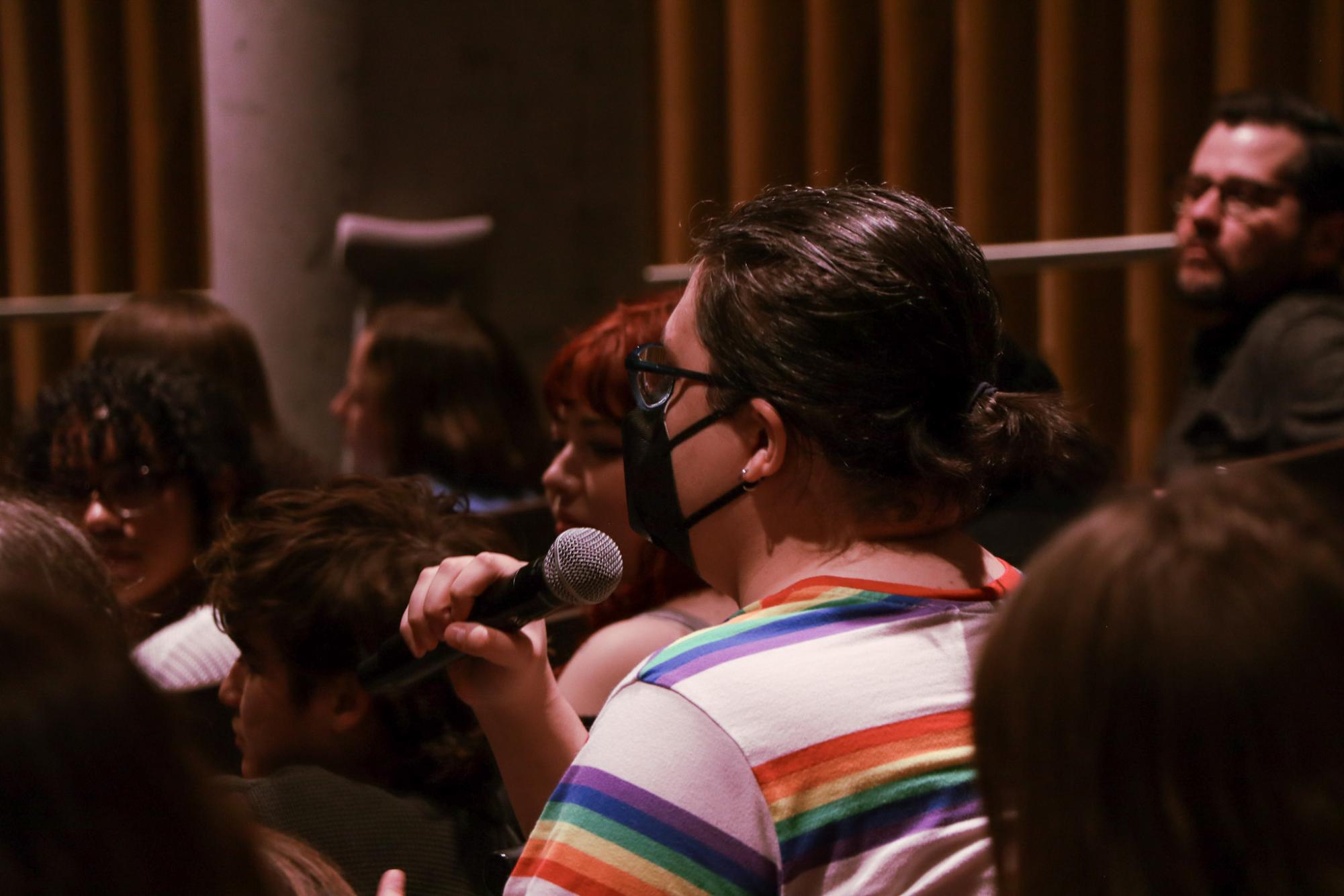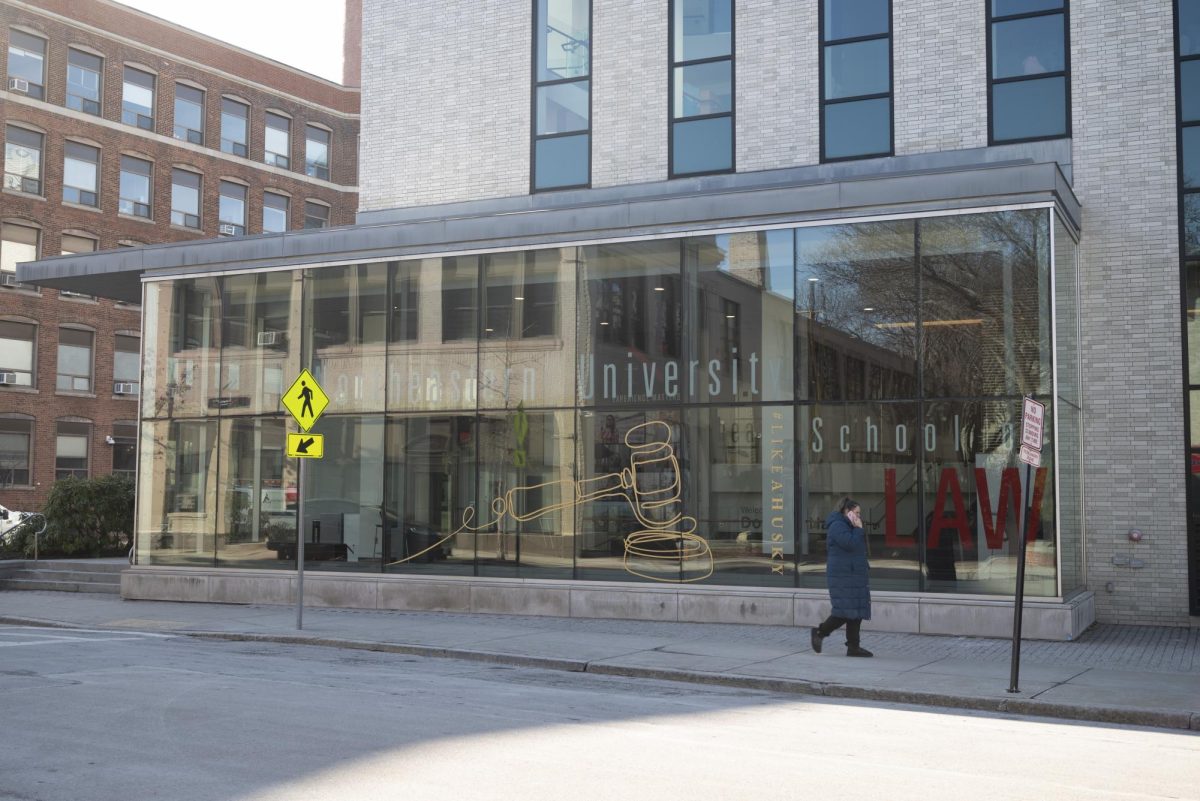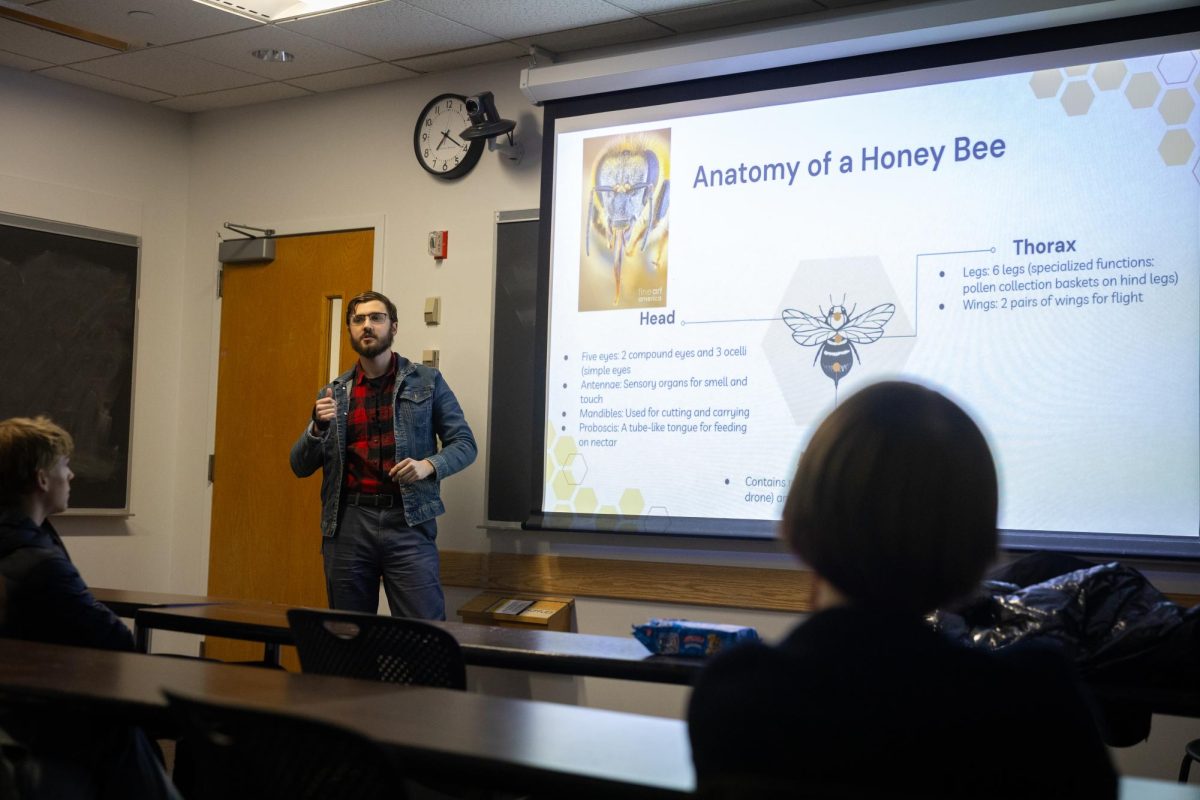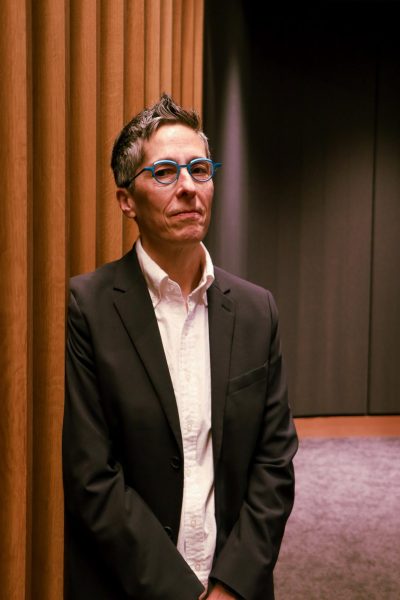
Throughout her literary career, Alison Bechdel has used her creativity, real-life experiences and the current cultural climate to tell honest stories of queerness and identity. Today, in our contemporary political hurricane, her work is more important than ever.
This year’s Hanson Lecture featured Bechdel, a MacArthur Genius Fellow and writer and cartoonist of the 2006 best-selling tragicomic “Fun Home,” which was transposed into a five-time Tony Award-winning Broadway musical. Bechdel is also the author of two graphic memoirs, 2012’s “Are You My Mother?” and 1986’s “Secret To Human Strength.”
“I was absolutely blown out of the water by ‘Fun Home.’ [The book is a reminder] that you are not alone in the world,” said Megan Cassidy, a third-year English major, as she introduced Bechdel.
The annual Hanson lecture series was created in honor of the memory of Peter Burton, a Northeastern alum who lost his life in the 9/11 attacks. This year’s lecture took place March 19 in the Interdisciplinary Science and Engineering Complex auditorium and hosted a full room of more than 300 attendees.
Along with Cassidy’s anecdote on “Fun Home,” Benji Rosenfeldt, a second-year English major, introduced Bechdel through the Bechdel-Wallace test, a method used to evaluate gender representation in media.
The test is famously used to measure women’s representation in movies, though it has also been applied to books and other media. To pass the test, a movie must meet three simple criteria. It must have at least two female named characters, they have to talk to each other and their conversation must be about something other than a man. Some famous movies that fail the test are 2012’s “The Avengers” and the 1961 classic “Breakfast at Tiffany’s.”
Bechdel mentioned the test as she showed the crowd slides of her comic strip, “Dykes To Watch Out For,” where the test originated, explaining that the basis of the measurement is to humanize women, especially in pop culture. Unexpectedly, the comical elements shone through: “The funniest thing I’ve read is words, not comics, I mean who reads that anymore?” Bechdel said as she joked about the book’s surprising fame.
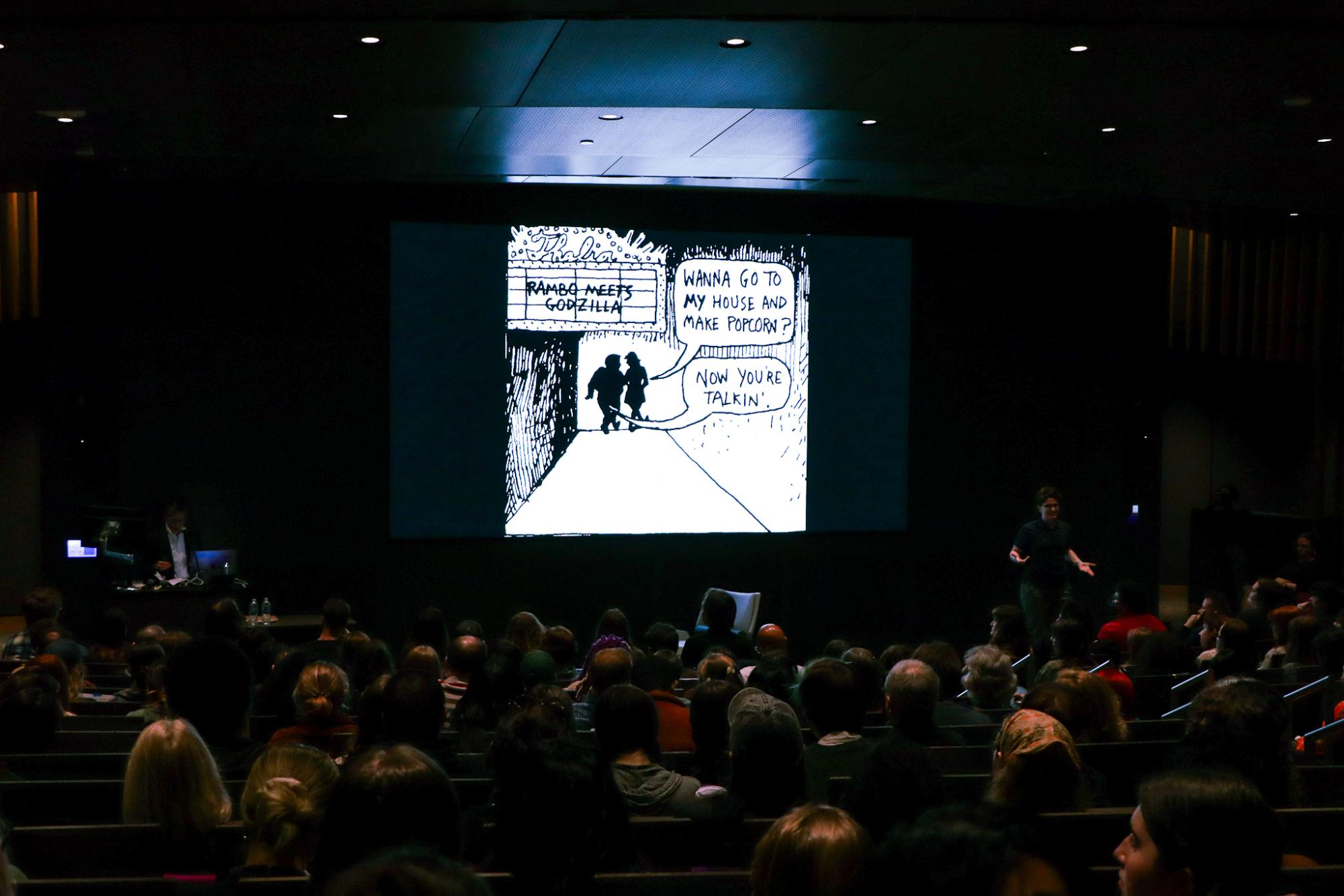
The third chapter of “Fun Home” mentions Bechdel’s discovery of the book “Word Is Out,” marking the start of her political consciousness at the age of 19. She embraced her lesbian-awakening and its universality.
“[Lesbian people] are the coolest people I’ve ever seen in the world,” Bechdel said as the audience laughed.
During her first year at college, Bechdel witnessed activists going to various protests for different causes, which led her to realize that the commonality between the “-isms” is capitalism.
“Like, where do I sign up? Sorry for telling you this, but I’m woke,” Bechdel said of the moment, adding that it inspired her to start working on her comics. Writing and drawing comics gave her a rewarding sense of mission to tell her stories.
Bechdel’s memoirs are beyond personal — they are the reflection of social activism in the 2000s. Bechdel recalled a class at Oberlin College on the “woke movement,” which made her realize “the bubble” that she was in and that even members of the LGTBQ+ community can be conservative. Later on, she started introducing politically and socially conservative characters into her comics.
Although marriage has been used for materialistic purposes because of the influence of capitalism, the legalization of gay marriage gave the community the means to be humanized, Bechdel said. It’s also been used to frame queer people as the scapegoat. The dichotomy of national policies was what Bechdel broke down in her talk.
“Marriage is actually revolutionary,” Bechdel said.
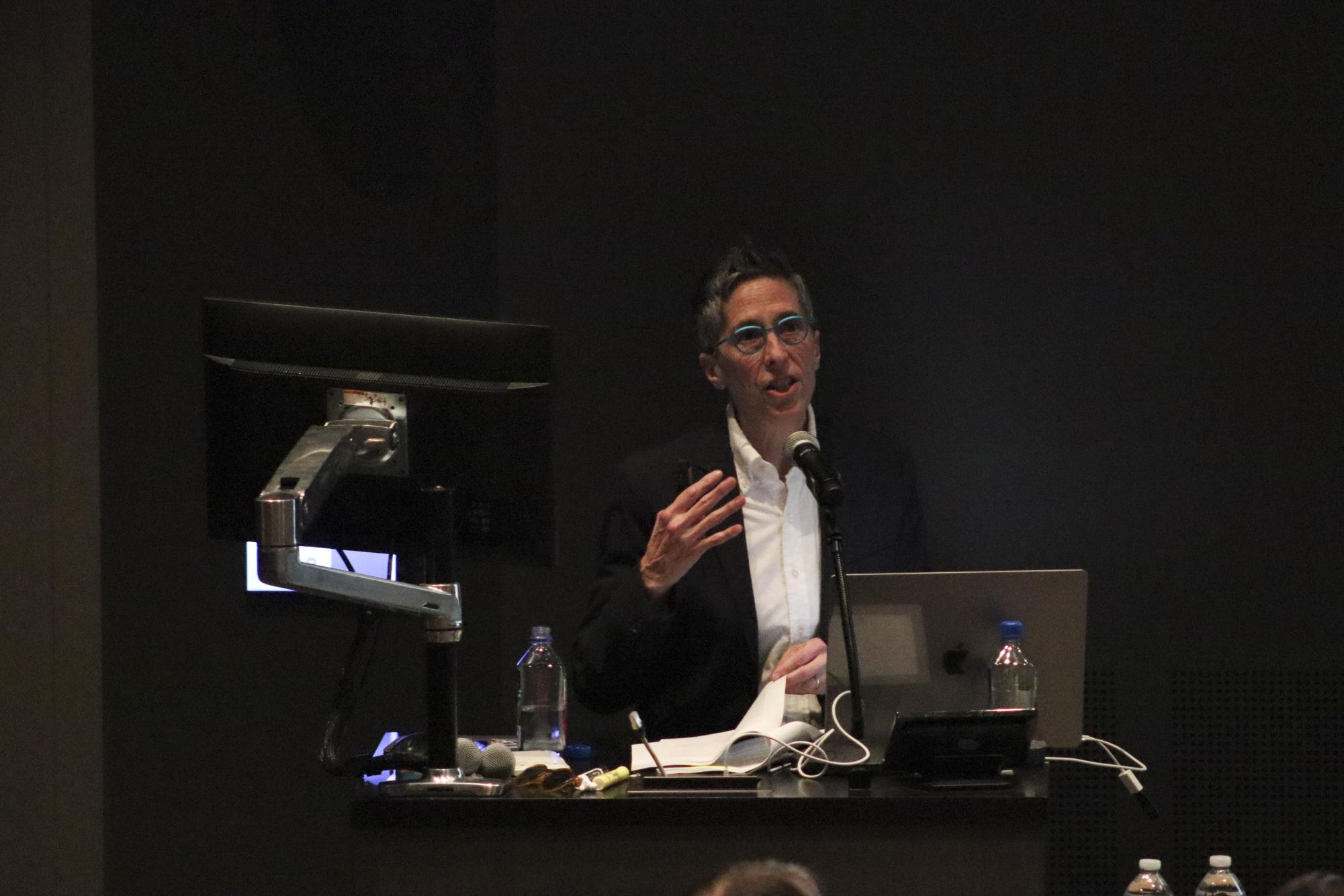
“Fun Home” was also a personal surprise for Bechdel: She expected its revelations would pull her family members closer, but instead the self-blame on her father’s death engulfed her as both of them experienced sexual shame and secrecy.
“The personal is political,” Bechdel said.
Bechdel’s dad’s forced-closeted story portrayed in “Fun Home” revealed a bigger picture of the LGBTQ+ movement in the 2000s. The conversation on queer rights is timeless — Bechdel compared the current book ban to the history of police harassment and social discrimination of the LGBTQ+ community that sparked the Stonewall riots.
While “Fun Home” saw Bechdel narrate her life around her father, in “Are You My Mother?” her mom takes center stage. In the book, she draws parallels between her mom helping her write diaries during her childhood to her therapy sessions of adulthood, both of which involve “a woman talking, listening and taking notes” about her thoughts.
During the talk, Bechdel also teased her new book to the audience, featuring all of her memoirs before. This time however, she will take on fiction with a twist. “It’s fun to write a fake memoir [and having] to invent these goats,” Bechdel said, pointing to a comic strip that was covered in goats.
The Q&A session, though short, gave an insight to how Bechdel managed to turn intimate stories into books.
“I dissociate,” Bechdel said. Explaining that when bringing her stories to the audience, it is important that the author believes in the reader’s trust. Writing a structured and coherent story about a complicated and messy life can be a challenging puzzle for the writer, she added.
Julia Minich, 28, heard about the talk through her aunt who is faculty at Northeastern. As an artist herself, Minich was inspired hearing Bechdel speak but wondered if she ever feels like her personal stories are not interesting enough.
“After the [lecture], it feels like maybe she [felt unimportant] at one point, but then was able to build up her ego in order to tell such compelling, amazing stories,” Minich said.
Bechdel’s work gives visibility and representation to a historically marginalized community as the comics bring affinity and a sense of acceptance.
“These comics are for us … I wanted to tell the truth about my life and these people like me,” Bechdel said.
